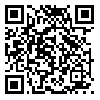Volume 24, Issue 93 (3-2025)
QJCR 2025, 24(93): 64-89 |
Back to browse issues page
Download citation:
BibTeX | RIS | EndNote | Medlars | ProCite | Reference Manager | RefWorks
Send citation to:



BibTeX | RIS | EndNote | Medlars | ProCite | Reference Manager | RefWorks
Send citation to:
Pakseresht E, Dehdast K. A Qualitative Study of Young Girls' Views on the Criteria for Choosing a Spouse based on the Qur'anic Model of Sahmgozari. QJCR 2025; 24 (93) : 3
URL: http://irancounseling.ir/journal/article-1-1999-en.html
URL: http://irancounseling.ir/journal/article-1-1999-en.html
(Corresponding Author) Master of Family Counseling, Department of Counseling, Refah University, Tehran, Iran. elahekp2@gmail.com
Abstract: (3923 Views)
Aim: In response to the growing need for contextualized criteria for spouse selection in Iranian society, this study explores the lived experiences of young women regarding such criteria, based on the Sahmgozari (participatory contribution) approach rooted in Islamic ontology. Methods: Using a phenomenological approach, purposeful sampling was conducted with 16 married young women who exhibited key indicators of the Sahmgozari lifestyle—such as feelings of tranquility and personal development, agency, and formative relationships. Semi-structured interviews were carried out and continued until theoretical saturation was reached. Data were then coded and analyzed. Findings: The analysis yielded three main pre-marital criteria for achieving the “desired self as a contributor in marital life.” The first criterion was development-oriented and tranquility-promoting attitudes in spouses; the second was awareness and preparedness regarding factors of similarity and difference; and the third was awareness of personal growth and maturity trajectories. Conclusion: Spouse selection criteria based on the Sahmgozari approach can broaden young women’s perspectives on marriage and support them in making rational and meaningful choices.
Article number: 3
Type of Study: Research |
Subject:
Family Counseling
Received: 2023/12/4 | Accepted: 2025/02/27 | Published: 2025/07/19
Received: 2023/12/4 | Accepted: 2025/02/27 | Published: 2025/07/19
Send email to the article author
| Rights and permissions | |
 |
This work is licensed under a Creative Commons Attribution-NonCommercial 4.0 International License. |






